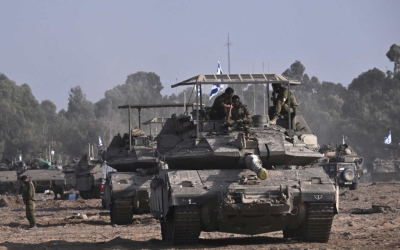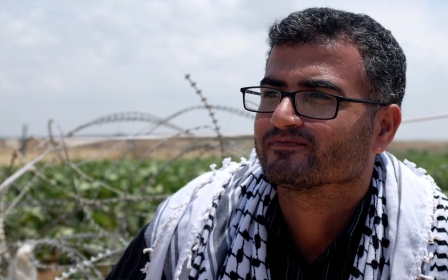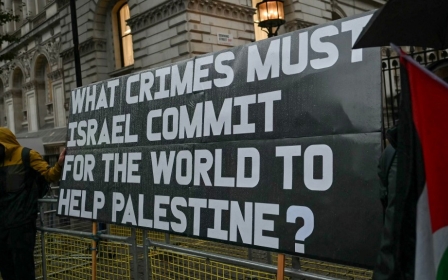Israel-Palestine war: Air strikes pummel Gaza, severing phone and internet services

Israel intensified its bombing campaign on the besieged Gaza Strip late on Friday, severing phone and internet communications in the embattled Palestinian territory.
Middle East Eye lost all contact with its staff inside the enclave as explosions from Israeli air strikes lit up the sky over Gaza City.
The Palestinian phone service provider, Paltel, said in a statement that the relentless bombardment had destroyed "all remaining connections between Gaza and the outside world”, leading to the complete interruption of communications services.
The service outage comes as Palestinians brace for an anticipated Israeli ground invasion of Gaza.
On Wednesday, Israeli Prime Minister Benjamin Netanyahu said that his government was preparing a "ground invasion". But it was unclear on Friday whether the intensification of military operations was the prelude for a wider assault on Gaza.
New MEE newsletter: Jerusalem Dispatch
Sign up to get the latest insights and analysis on Israel-Palestine, alongside Turkey Unpacked and other MEE newsletters
The Israeli military told Reuters and AFP on Friday that it cannot guarantee the safety of their journalists currently working in the besieged Strip.
In a letter written to the two international news agencies, the military said it was "targeting all Hamas military activity throughout Gaza" and that its bombardment could cause damage to surrounding buildings.
"Under these circumstances, we cannot guarantee your employees' safety, and strongly urge you to take all necessary measures for their safety," it said.
An Israeli military spokesperson told ABC News that the expanded ground operation was not an official ground invasion, while an unnamed US official also told the outlet that Israel was launching a "more limited incursion".
Israeli President Netanyahu's advisor, Mark Regev, spoke to several US media outlets on Friday, saying "Hamas will feel our wrath tonight".
"They will continue to be on the receiving end of our military blows until we have dismantled their military machine and dissolve their political structure in Gaza. When this is over, Gaza will be very different," Regev said on Fox News.
Follow Middle East Eye's live coverage of the Israel-Palestine war here
Late on Friday, UN secretary general Antonio Guterres pressed for a ceasefire, calling it a "moment of truth".
"I repeat my call for a humanitarian ceasefire in the Middle East, the unconditional release of all hostages, and the delivery of life-saving supplies at the scale needed," he wrote on X, formerly known as Twitter.
"Everyone must assume their responsibilities. This is a moment of truth. History will judge us all."
A resolution co-sponsored by Jordan passed late on Friday, supported by 120 UN members, called for an “immediate, durable and sustained humanitarian truce” and demanded all parties comply with international humanitarian law and “continuous, sufficient and unhindered” provision of essential supplies and services into the Gaza Strip.
Fourteen members voted against the resolution, including Israel, the US, Hungary, Austria, Croatia, and Fiji.
Palestinian media and residents have said that Friday was the most intense bombardment they've faced in the war to date.
Ground invasion
Israel has promised to invade Gaza since a Hamas-led attack on 7 October left more than 1,400 people dead and resulted in around 220 taken to Gaza as prisoners.
Unverified reports on social media on Friday highlight that Israeli tanks were trading fire with Palestinian armed groups in Gaza as part of Israel's limited incursion into the besieged enclave. Jordan's envoy to the UN on Friday said that Israel had already launched its ground invasion.
Hamas’s armed wing said that they had “foiled an Israeli ground incursion into Beit Hanoun and the east of Bureij”, according to Al Jazeera on Friday. The al-Qassam Brigades added that violent clashes with Israeli troops were ongoing. Beit Hanoun is a city in the northeastern part of the enclave, while the Bureij refugee camp is in the central Gaza Strip.
Israeli air strikes have reduced towns and cities to rubble and killed more than 7,300 Palestinians, according to the Palestinian health ministry.
Israel and the US have disputed the ministry's casualty figures but on Thursday, the health ministry published a 210-page report detailing the names, ages, genders, and ID numbers of every person killed in the enclave.
Despite Biden questioning the accuracy of the death toll, HuffPost revealed this week that the State Department recently cited the Palestinian health ministry in Gaza in nearly 20 "situation reports".
US Defence Secretary Lloyd Austin has held near-daily phone calls with his Israeli counterpart, Yoav Gallant, to discuss operations; while senior US military officials with knowledge of urban warfare have also been dispatched to Israel.
David Schenker, a former State Department official, told MEE earlier this week that "US strength and standing in the region is going to be directly linked to Israel’s performance in the war."
"Even worse than what happened on 7 October for the US, would be Israel getting bogged down in Gaza," he said.
MEE previously reported that US officials asked Israel what its plans for the Gaza Strip would be after a potential ground invasion.
Israeli officials have said they have no plan for the impoverished Mediterranean enclave - home to more than 2.1 million Palestinians - once they are done waging war there.
“The US is telling Israel they inherit the reality on the ground after a land invasion,” a former senior US official familiar with the Biden administration’s thinking, told MEE. “And it’s not in anyone’s interest to be caught in a quagmire.”
The New York Times reported on Friday that Saudi officials recently warned Washington that an Israeli ground incursion could be catastrophic for the region.
Middle East Eye delivers independent and unrivalled coverage and analysis of the Middle East, North Africa and beyond. To learn more about republishing this content and the associated fees, please fill out this form. More about MEE can be found here.





